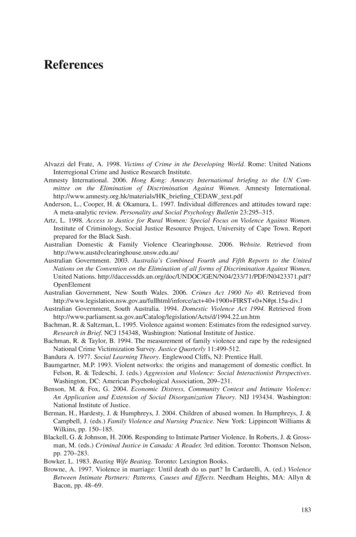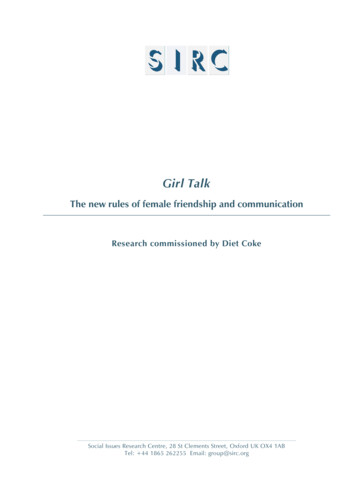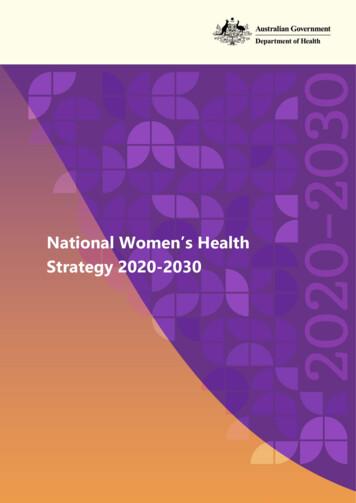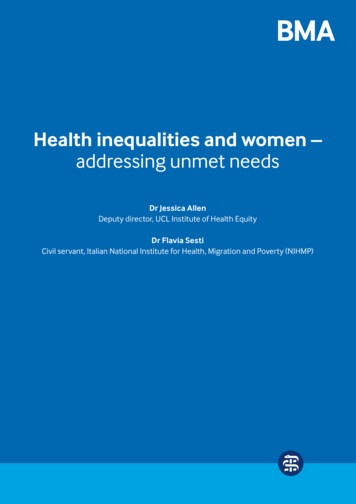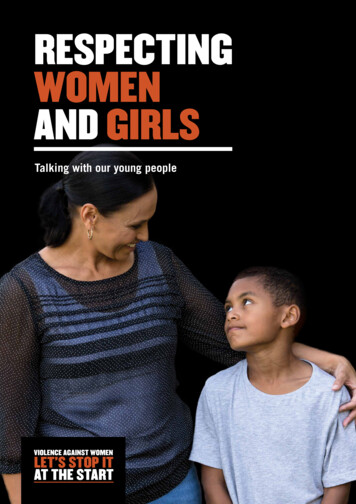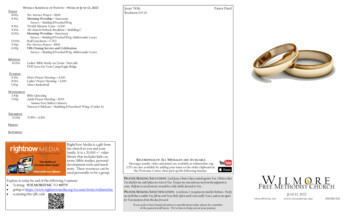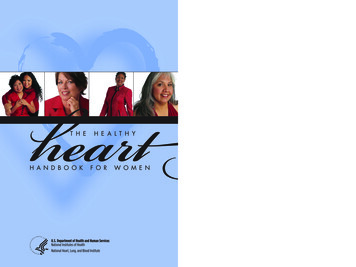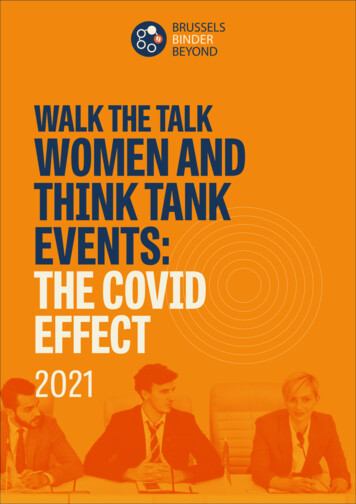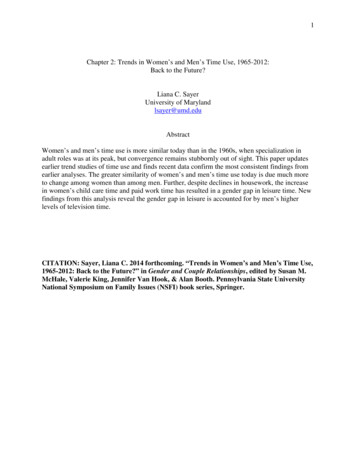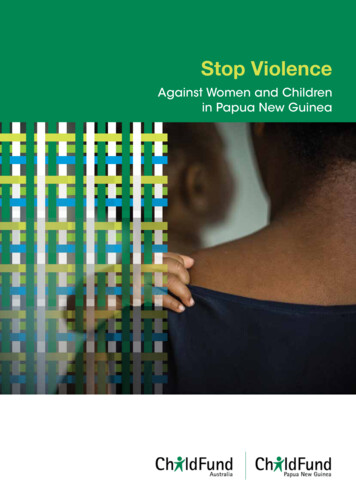
Transcription
Against Women and Children in Papua New GuineaStop ViolenceAgainst Women and Childrenin Papua New Guinea
Stop ViolenceViolenceTHIS report features interviews conductedin Papua New Guinea by Diana Mason,communications and marketing director,ChildFund Australia; Vlad Sokhin, documentaryphotographer; and Heather Wiseman,National Press Club of Australia’s HealthJournalist of the Year 2012.ChildFund understands thatviolence against womeninevitably hurts children, too.It also draws on qualitative field researchand a literature review conducted byindependent consultant Sarah Martin onbehalf of ChildFund Papua New Guinea,and edited by ChildFund Australia staff TerinaStibbard, international program coordinator,and John Fenech, program and partnershipsdevelopment coordinator.ChildFund Papua New Guinea staff contributedsignificantly to this project. Special thanks toManish Joshi, country director; Fiona Fandim,senior program officer; Margaret Gebai,supporter relations officer; and NamuelNungwehim, procurement officer.ChildFund Australia would also like to thankand recognise the important work being doneby City Mission Haus Ruth, Family SupportCentre, Family and Sexual Violence ActionCommittee and Papua Hahine.ChildFund Papua New Guinea is a representativeoffice of ChildFund Australia, which is an AusAIDaccredited, independent and non-religiousinternational development organisation. Ourvision is a global community free from poverty,where children are protected and have theopportunity to reach their full potential.Photos: Vlad SokhinWords: Heather WisemanDesign: MZ DesignCopyright: ChildFund Australia, August 2013www.childfund.org.au2
Against Women and Children in Papua New GuineaSammy experiencedso much violence inhis first few monthsof life that suddennoises scare him.Margaret and SammyWomen and children are hurtingFOR years, Margaret endured herhusband hitting her with knives,stones, metal and bottles. He saidhe would find boys to pack-rape herand she lived in fear of his chillingdeath threats: “You see this stone? Itis nice and hard and round. If I putit on your head you are dead. Whenwe are at home I will really kill you.”When Margaret speaks of theviolence she has lived through,the real pain surfaces when sheexplains how her husband hurt theirlittle boy. Sammy experienced somuch violence in his first months oflife that when he hears a suddennoise, he cries and needs Margaretto hug him.When Sammy was just one monthold, Margaret’s husband tried topunch her in the face and missed,knocking the baby unconscious.Sammy’s pupils constricted andMargaret watched on, terrified, asher husband shook the baby torevive him. He then threatened tokill Margaret with the iron bar in hishand as he demanded, “Come andget the child.”defend them speak of the brutalbeatings they have experienced atthe hands of relatives.Hopefully Sammy won’t rememberhis father trying to hit Margaret whileshe was breastfeeding him, or hisfather picking him up and using hislittle body as a weapon to hit her.ChildFund understands thatviolence against women inevitablyhurts children, too. That is why,with the benefit of almost 20 years’experience working in Papua NewGuinea, we have developed aninnovative new program focusedon family violence, which we will rollout in Central Province, east of PortMoresby (see details, page 14).Margaret’s story is extreme, which,sadly, makes it representative. InPapua New Guinea, women areraped, killed and maimed on ashocking scale. The brutality is severe,often involving bush knives, axes,burning and even biting. In thefollowing pages, you will hear froma woman whose bottom lip wasbitten off in a random attack, andanother who was relentlessly beltedand raped by her husband overthree consecutive days. Two grievingwomen tell how their sister died afterher husband smashed her headagainst a car, leaving her youngchildren motherless. Young womenwho grew up without mothers toIn this report, we share what we havelearnt through field research thatwas conducted to inform this newsupport and education program.We also share devastating personalstories, told by women who feelcompelled to speak out becausethey do not want the men they fearto silence them. These women wantto raise awareness in Australia andPapua New Guinea. They want theviolence to stop. Please considerhelping ChildFund to support them.3
Stop ViolenceKay and herdaughter, Wendy,have both beenviolently assaultedby Kay’s husband.Kay with her children, Michael and WendyWhen Daddy is a dangerous manAT just five years of age, Wendy hasfelt her father’s fury firsthand.she sleeps, she’s always callingmy name.”“[He] got the little girl, bashed herup and then lifted her up, face down,and threw her on the concrete,” saysher mother, Kay. He split Wendy’s lipand injured her jaw.Kay’s husband has hit her with ahammer, stabbed her feet withkitchen knives, cut her with bushknives and whipped her withextension cords. Once, he beltedher from 10pm until Kay escapedat 5am. She hid in the bush beforerunning to the police station.Wendy has also stood, watching inhorror, as her father whipped andstabbed her mother’s back and legs.“[Wendy] just stands there andstares at us and cries and cries. It’slike a nightmare to her. In the nightshe doesn’t sleep properly. When4“He used an empty bottle to hit meon the head and he also used avery big, long twig; it wasn’t dry. Heused it to hit me on my back and onmy legs. I have bruises on my back.I have marks on my arms.”Realising that her life was in danger,police brought Kay and her childrento Haus Ruth women’s refuge in PortMoresby. Her husband continues tomenace them, making threats frombehind the refuge’s security gates.Kay, 24, insists her story be told witha clear image of her face and herreal name. She refuses to let herhusband silence her. It’s unclearwhere she will next find safety.She desperately wants to “livesomewhere where he won’t botherme and the children again”.
AgainstAgainstWomenWomen andand ChildrenChildren inin PapuaPapua New GuineaLittle hope oflegal redressRUGGED terrain, poverty and a shortageof village courts are just some of theissues preventing the law from protectingvulnerable women and children in RigoDistrict, where ChildFund works in partnershipwith 19 villages.A huge problem that’s hard to measureIt is widely reported that violence occursin more than two-thirds of families in PNG.Some studies say one in two women will beforced to have sex in their lifetime; one smallstudy found 86% of women had been beatenduring pregnancy.In truth, there is no official data on violenceagainst women and children, but theincidence is likely to be higher than twoin three. Many researchers believe this isjust the tip of the iceberg, a view supportedby ChildFund’s research. Most womeninterviewed during our field research in RigoDistrict, Central Province had experiencedviolence, and not one claimed to have ahusband who had never beaten them.Women said their children were often presentwhen their partners were violent towards them.Monica Richards, who manages Haus Ruth,Port Moresby’s main women’s shelter, saysabout 60% of children who come to the refugewith their abused mothers have also been hurt.“Most [men], when they touch the women, theytouch the children as well,” she says.According to former PNG parliamentarianDame Carol Kidu, children younger than 16represent half the people who seek medicalhelp after being raped. One in four is youngerthan 12. One in 10 is under eight.ChildFund met six senior men with rolesrelated to the court system, including districtplanner Murray Konido. He says there areremote areas in Rigo that are lawless, as thereare only six village courts to serve 228 villages.More than half of Rigo’s population has towalk to access legal services, some travellingfor a week and sleeping on the side of theroad as they make their trek.“We have no village courts up in themountains – nothing. Even [some] murdercases are not being addressed,” saysMurray.“There are children and women exposedto violence, but they are not helped. The[court] coverage is very, very small. Women orchildren or even men are out there, and theirvoices and rights are not heard.”Village magistrates, who hear civil cases fora fee, have no formal training or backgroundin law, mediation or counselling. They aregiven a manual of penalties to follow,so fines are uniform.District community development officerJeffrey Gei, who has paralegal training, saysmany women can’t afford to pay a magistrateto hear their cases. He is concerned thatsome criminal cases, such as rape, arehandled by police when they should beheard by district or national courts.“How [these cases] are addressed at thepolice stations we don’t know becausethere is no working relationship,” he says,adding that some police impose illegalfines and do not execute the District Court’swarrants for arrest.1Ganster-Breidler, M., 2009. Gender-based Violence and the Impacton Women‘s Health and Wellbeing in Papua New Guinea.The National Court visited the district for thefirst time last year. Crowds of people cameto watch as two men were found guilty ofhaving wilfully murdered their wives.2Dame Carol Kidu, Transcript: Sex, Women and 21st Century inPapua New Guinea, 2012. Speech given at Australian NationalUniversity to celebrate International Women’s Day. Dame Carol Kiduwww.pameladenoonlecture.net/the pamela denoon lecture/pamela-denoon-lecture-2012.html“Lots of people come to hear,” says Murray.“It is important because that is another wayof teaching people.”5
Stop ViolenceA man bit off Helen Michael’s bottom lip in a random, violent attackDisfigured in a random, violent attackTo protect people from being upsetby her appearance, Helen Michaelwears a large bandaid on her face.It sits across the hole where herbottom lip once concealed herlower teeth.“I asked the police what hashappened to this man and thepoliceman said there was not goodenough evidence so they released[him]. So I just stood in front of thestation and I cried.”Helen’s lip was bitten off in an attackone night about two years ago onthe streets of Port Moresby. Walkingto get her husband a meal, she washit to the ground and after a fight,knocked unconscious.Surrounded by her seven children,with another she has adopted onher knee, Helen says her husbandis supportive.“When I was lying down, he camejust fall on top of me and opened hismouth and then started biting mylip,” says Helen.Helen’s husband heard her screamsand helped her fight off her attacker.They got him to the police station,but he was released without chargea few days later.6“He [says], ‘My woman, you were notlike this when I marry you. But youare mother of children. We can staytogether forever.’”The family lives in a makeshiftsettlement where there is norunning water or electricity. Theirtiny one-room house is made of tinsheets and has a dirt floor. Helencannot afford surgery to repair herinjured face.“I don’t feel good about myself whenI am putting on this [plaster]. I shouldhave a normal lip,” says Helen.“Sometimes when I sleep, I dreamhe will come to me and I am reallyscared about it. I think he is comingback again.”Helen is not alone in having beendisfigured by being bitten. Whilevisiting the Family Support Centre inPort Moresby, ChildFund saw imagesof women who had lost chunks ofskin, cheeks, noses and ears, havingbeen bitten in violent attacks.“I don’t want violence againstwomen today,” says Helen.“I want these women who areexperiencing this violence to comeout, and we can join our hands andwe can fight for our women’s rights.”
AgainstAgainstWomenWomen andand ChildrenChildren inin PapuaPapua New GuineaWhy some womendon’t go to the policeWOMEN interviewed in Rigo District as part ofthe field research were overwhelmingly negativeabout the district police, commenting that they“treat women like criminals”, “act like criminals” and“cannot be trusted”. Women said police were notinterested in responding to violence against themand that they were sometimes perpetrators of theviolence. Some women were scared of police; itseemed to be a last resort for serious attacks, whenwomen were frightened for their lives, rather thana potential source of support.The police officer interviewed at Rigo Stationacknowledged that women were afraid andreluctant to report incidents to police. Instead, theywere more likely to try to resolve the issue throughtheir village magistrates, or rely on mediation.The officer said police lack basic resources, such aspetrol, that there were no female police officers atthe station, and police hadn’t been trained to dealwith violence against women.PNG has no form of social security, so when ahusband is a family’s chief breadwinner, his wifemay be left with no income if he is jailed. Onewoman told ChildFund, “When we go to see [thepolice], they might put the man in jail. We do notwant to see them in jail. The women will suffer if themen are in jail. What will happen to our children?”Another woman showed a scar on her thigh andsaid, “This is where my husband speared me.”She had considered going to the police after theincident, but decided not to as she didn’t want himto be arrested.Inadequate medical careChildFund’s field research in RigoDistrict, Central Province found thatsurvivors of sexual violence did nothave adequate access to medicalcare. District hospitals and subdistricthealth clinics were not able to providesurvivors of rape with emergencycontraception or post-exposureprophylaxis to prevent HIV. They alsolacked safe, confidential spaces wherewomen could be supported.7
Stop ViolenceA second attempt to achieve justiceIT was a simple pamphlet thatinspired Amanda to try to achievea life free of fear and pain. She’dspent six years of her married lifebeing physically and sexuallyassaulted, so when she read thatit was a crime for a husband tobeat or rape his wife, the messageresonated. The next time she wasbrutally attacked, Amanda tookthe brave step of reporting theviolence to police.Police arrested her husband andhe spent two years in jail awaitingtrial. Then he was released. Thecase was dismissed due toinadequate medical evidence.Amanda had not been able toafford to pay 20 kina ( 10) for amedical certificate.Amanda’s firstattempt to have herhusband convictedfailed, as she couldnot afford a medicalcertificate.8Police were concerned forAmanda’s welfare, but her interimprotection order was delayedand her husband forced her toreturn home.“He didn’t change his ways,” saysAmanda. He accused her of havingaffairs with other men while he’dbeen in jail and assaulted herover three consecutive days with arubber hose and a long screwdriver.“He was continually punching myface,” says Amanda. “He said hewould make me paralysed. I wasreally injured.“When he bashed me up he didn’tleave me alone. He had sexualpenetration with me again, withoutmy consent. I was really in pain.When I said no, he said, ‘I am goingto bash you up.’ He had sexualpenetration with me again.”After the three-day assault,Amanda’s husband insisted shego to work. Her boss allowed her togo to hospital, where health workersoffered to write a medical report.This time Amanda had 20 kina.Equipped with a medical report,Amanda is feeling more confidentabout facing court a second time.Given the broad acceptance ofviolence against women in PNG,she hopes her story will encourageother women to act, too.“I feel proud to tell the other ladies,‘There is the law to protect us,’”she says.
Against Women and Children in Papua New GuineaTaina Gebai is a community elder who regrets once having been a violent manSome men have changed for the betterTAINA Gebai grew up in a familywhere he respected his mother andsisters. He married a “very beautifulgirl” who he says was “a friend to alland an enemy to none”. He built hera home so she would not have todo domestic chores for his relativesand they lived happily until hebecame an alcoholic.“Priority number one was a cartonof beer and the rest I buy food forthe family,” he says.Taina says he hit his wife twice“out of frustration – not like othermen do”, but he was more violenttowards his children. Whenever hehad an argument with his wife, hewould hit them.“They were scared,” he says. “I regret[it] because those were the thingsthat I should not have done.“So with all this hard times I give mywife and my children, somethingclicked,” says Taina, who says hewas asked to join the church. Hesays going to church every Sunday“made me move away from thebad side of life” and he and his wifelived happily, as equal partners,until she passed away.PNG needs programs for menChildFund’s field research showsPNG does not have enough nationalprograms that work with men inorder to change prevailing socialnorms that allow widespread andobvious violence.9
Stop ViolenceCries for help often go unheededSOMETIMES Regina’s husband hither at home, but usually it was infront of other people. The motherof five remembers the humiliationof him ripping her dress off andbashing her, naked, out the front oftheir home.“People watched,” she says.She also remembers the trauma ofhim turning up at her workplace.“I lost a couple of jobs,” she says.“At work they told me to stay awaybecause this was an industrial areafor people to work, not to fight. Thepolice station was nearby and stillthere was not help there.“There are a million other womenwho are facing the same problem.”Like many other women ChildFundspoke to, being hit in public didn’tEducationmakes adifference“MAN hitting the woman is a bigwrong,” says Matthew Vagi. It’s amessage you would expect to comefrom Matthew, given that he is avillage court magistrate, but it’s onehe hasn’t always known.For many years Matthew used tobeat his wife, Rebecca, but when hebecame a magistrate he was givena government-issued law and orderbook to follow when imposing fines.Reading the book taught him thatassaulting wives is wrong.He now hears domestic violencecases and fines men who beattheir wives. Rebecca says she isproud of Matthew and he is nowa good husband.10make it any easier for Regina toget help. Neighbours, friends andextended family are often unwillingto meddle in what is seen as privatefamily business. They are also scaredthat they will be assaulted, too.One woman who heard herneighbour being bashedunconscious told ChildFund, “I feelso guilty. Someone should havehelped. Next-door neighbours werethere, but [in PNG] we say it is theirown business.”Another in a rural community sayswomen from small villages find ithard to help women who are beingabused. “They are scared of thehusband, too,” she says. “They mighttell the husband [to stop] and hewould say, ‘This is our family matter,so don’t include yourself.’”Regina’s husband broke her noseseveral times. He did not beat theirchildren, but when he belted andhumiliated his wife in public, he hurtthem, too.“They didn’t like the violence,” shesays. “The worst thing is a mothercoming home with bruises andblood and all of these things. Itwas really hurting them. They werealready at school and I didn’t wantthem to be part of it. They were hurtbecause I was hurt.”Regina’s faith in men has beeneroded by her violent married life.“I was scared that if I remarry, theperson might molest my children,”she says. “That is why I haven’tsettled down yet. I am not sure thatI want to get another husband.”Rebecca with her husband, Matthew, and their daughter
Against Women and Children in Papua New GuineaSusan was ingrade two whenshe fled home,scared for her life.A child terrified in her own homeWHEN she was just eight yearsold, Susan was asked to boil ricefor a family meal. She used toomuch water and ruined the rice,so her stepmother attacked herwith a bush knife. Susan, now 14,remembers locking herself in aroom, terrified and screaming.“She was bashing on the doorsaying, ‘Let me peel your skin off.’I was really scared. She was yelling,‘You will go to the hospital!’” saysSusan.“The whole neighbourhoodcame and she got shy. Becauseeveryone came she couldn’t beltme. The neighbours told me this ischild abuse.”Susan was often assaulted by herstepmother, particularly after herparents had been fighting.“She takes it out on me,” says Susan,whose mother died when she wasa toddler.“She punches my eyes. She canthrow me from one side of the roomto the other side.”Susan says her father regularlybashed her, once breaking her jawand often splitting her lips.“He is very violent. He belted meup to a point where I slept for twowhole weeks and my bones weresore,” she says.“He hits me because I do things,like get something to eat. He isstressed so he belts me up.”Susan fled her home when she waseight and has since been living withneighbours and other families. Shefeels unwanted by the people shelives with now and is concernedthey want her to leave.Services hard to accessChildFund’s field research highlightsthat expensive and inadequatetransport makes it difficult forwomen in Rigo District to accessmedical attention in Port Moresby.ChildFund interviewed one womanwho ran out of money while herhusband was working away forweeks. He returned home one nightwhen she had gone to get foodfrom her parents. He accused herof adultery and beat her and theirbaby with a stick. The woman wouldnot have been able to afford to getmedical attention in Port Moresbybut for the help of a local pastor.11
Stop ViolenceTaking a brave stand for her babyROSE knew her husband was violent.He had often attacked her with a knifeand she feared he would kill her. But thethreat he posed became even moreominous when he hurt their baby girl.In a society with no social security,Rose was grateful to find safety atPort Moresby’s Haus Ruth, while shewaits for a medical certificate andfurther legal advice.Rose was confused when she sawher three-month-old daughter’sinjuries. Suspecting her baby hadbeen sexually assaulted, Rose tookher to hospital, where medical staffconfirmed her worst fears.She’s had little support from herfamily, as they did not believe herbaby had been molested andinsisted she should stay with herhusband.“She was examined by the nursesand they told me that someone hasbeen playing with her private parts,”says Rose of injuries that had left herbaby crying in pain.“People were scared,” saysRose.“They said, ‘No, go back.He is going to kill you.’ But I said no,it is a crime, so I have to go get helpand put that man to court andmove on with my life.”Rose’s family thinksshe is risking herlife by leaving herhusband, but sherefuses to put herbaby at risk offurther sexual abuse.Rose with her baby12
Against Women and Children in Papua New GuineaJessica and Mollygrieve for their oldersister, Margaret,who died after herhusband bashedher head on a car.Jessica and Molly hugging near their sister’s graveDevastated by a senseless, violent deathJESSICA and Molly were just toddlerswhen their mother died. Their eldestsister, Margaret, aged 11, stepped intoher mother’s shoes and raised them.them, she sought refuge withrelatives in the city and kept working.But her husband tracked her down.mouth when she died. The doctorthought she died because she washit on the car.”“He went and found her andsmashed her head on a car,” saysJessica. “No-one stopped him.He belted her too much. There wasblood pressure. She couldn’t seeproperly anymore.”Jessica and Molly reportedMargaret’s death to police, butJessica says “they did nothing”.The sisters, who are saving forMargaret’s tombstone, are angrythere has been no justice.Jessica learnt that Margaret’shusband was violent when she visitedthem in the city and saw him belt hersister up at a bus stop. Despite thefamily’s attempts to protect Margaret,he continued to assault her, giving herblack eyes, a swollen face and oncebreaking her arm.Margaret sent her sisters a textsaying she was badly injured andcouldn’t walk, so they took her tohospital.“I do not feel good. Margaret isnot supposed to die and she died,”says Jessica.“My sister is short and the man wastall,” says Jessica. “He used to punchher. He is a big man.”“I didn’t believe. I was crying andasking them and they said that’strue, Margaret has left us.Margaret was so scared for herchildren’s safety that she sent themto live with her sisters. Needing toearn enough money to support“The doctor told us when thehusband hit her the blood was toomuch in her brain. There was bloodrunning from her eyes and nose andNow, Jessica and Molly arestruggling to comprehend their oldersister’s violent death and the sadirony that they will raise Margaret’syoung children.“One week at the hospital andMargaret left us,” says Jessica ofher sister’s death.She is sad that Margaret’s childrensaw their father’s attacks and tellstories about their parents fighting.But she finds some solace in beingable to care for them, as her bigsister cared for her.“I am missing my sister but herkids are with me,” she says, addingthat she’s pleased the eldest lookslike Margaret.“I feel like my big sister is with me.”13
Stop ViolenceWe will workwith children,too, engagingschools in an earlylearning pilot thatwill teach conflictresolution, opencommunicationtechniques, andthe importance ofrespecting girlsand women.What ChildFund will doContributing to our Stop Violenceappeal will help fund a significantnew program that will providebetter medical care for womenand children who have beenassaulted, and prevent violencein the long term.ChildFund Australia CEO NigelSpence says the program will runin the 19 villages ChildFundpartners with in Rigo District,Central Province.“Despite being just a few hours’drive east of Port Moresby, thesevillages are isolated and lackadequate medical care,” says Nigel.“Five of the most isolated villagesrarely have access to publictransport and some women whoare assaulted have to walk 22kmfor medical attention.”The program includes a rovingmobile health clinic, which will be14staffed by two counsellors and twonurses. It will:provide potentially lifesavingmedical assistance (preventingHIV/AIDS, pregnancy, sexuallytransmitted infections, etc);provide counselling and referrals;support women to report incidentsof violence and equip them withmedical certificates, if required;provide information on women’slegal rights and services that canassist them; andtrain 50 village health volunteersto treat and support womenmore effectively.ChildFund aims to influence menthrough a culturally appropriatesocial justice program designed tochange attitudes towards violenceand gender equality, and normaliserespectful, equal relationships.ChildFund PNG country directorManish Joshi says the programwill work with men to help themunderstand the reasons behindindividual acts of violence andabuses of power.“We will also give them accessto respectful techniques, such asnegotiation, that will help them achievepeaceful conflict resolution and providemotivation by highlighting what theyhave to gain by changing violentattitudes and behaviours,” he says.ChildFund understands theimportance of partnering with localservices and working to strengthenthem. We are partnering with thenational Family and Sexual ViolenceAction Committee, the provincialand district departments of health,Papua Hahine and school boards ofmanagement. We also assist HausRuth to support the needs of childrensheltering at the refuge.
AgainstAgainstWomenWomen andand ChildrenChildren inin PapuaPapua New GuineaWhat women saidChildFund explained its new programto a group of women from a villagein Rigo District, Central Province.This is what they said:“When the woman hasbeen bashed she hasno money to go to thehospital. A bus couldhelp them.”“Most men do not knowabout women’s rights.It is a good idea to havetraining.”“The training should begiven to both men andwomen. A man shouldbe made a leader in thatarea so he is appointedby the community and hehas every right to go inand stop the fights.”“Women, we understand[that violence is notOK], but men do notunderstand. We musthave awareness formen and children fortheir rights.”“We need to bringmen and women togetherso both of them areaware [of training toprevent violence] at thesame time.”15
Stop ViolenceStop Violence AgainstWomen and Children inPapua New GuineaDonate to ChildFund’s appealwww.childfund.org.au1800 023 60016
Stop Violence 4 AT just five years of age, Wendy has felt her father's fury firsthand. "[He] got the little girl, bashed her up and then lifted her up, face down,
